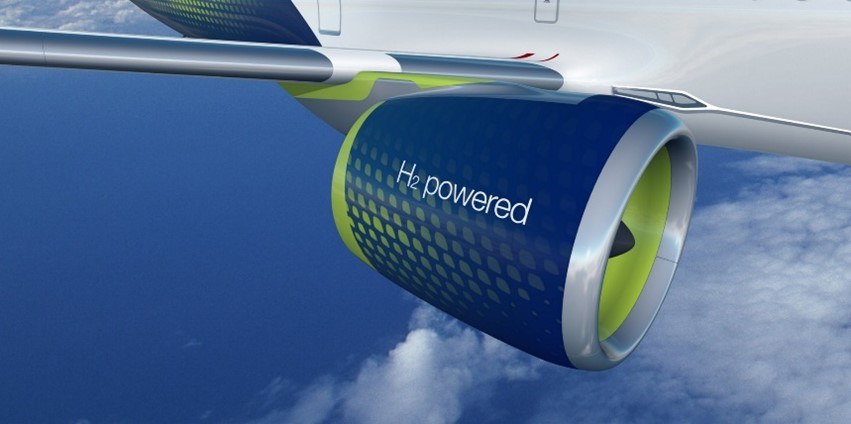Soaring Towards a Greener Sky: Hydrogen's Flight in Aviation
Posted 29/09/2023 by Keira flavin

Amid escalating environmental concerns, the aviation industry is moving towards sustainable practices. An emergent contender in this endeavour is hydrogen fuel, a promising alternative to conventional aviation fuels. As climate change urgency increases, the need for a transition to eco-friendly alternatives intensifies. With hydrogen being an abundant source of energy, and producing significantly reduced emissions, attention has been turned towards the potential of hydrogen and its future in aviation.
The Switch: A Necessary Move
The aviation industry contributes 1.9% of greenhouse gas emissions [1] and is on a steady increase, with demand for air travel expected to double by 2040 [2]. Turning attention to environmentally conscious fuels is imperative. Hydrogen is a clean fuel; emitting just water vapour when produced through electrolysis, powered by renewable energy. Adopting hydrogen will contribute to combating climate change, not only in the aviation sector, but in many industries.
The Pros and Cons of Hydrogen Fuel
Hydrogen - abundant and versatile - has captured attention as a clean energy carrier. However, its utilization in aviation poses both opportunities and challenges. Hydrogen combustion produces only water vapour, eliminating carbon emissions that are conventionally released into the atmosphere[3], and also results in quieter propulsion systems compared to traditional jet engines. Due to Hydrogen having a wide flammability range of 4% to 75%[4], and a low burning point, it needs to be stored at extremely low temperatures, typically in liquid form. This stresses the need for innovation in all areas, from production to transportation and storage in order for it to be safe to use in an aviation context. Moreover, the production process, while offering a carbon-free approach through electrolysis powered by renewable energy, also hinges on fossil-fuel-dependent methods like steam methane reforming. As with most new ventures, it comes at a high cost, with the need for development in infrastructure and technology. Whilst hydrogen aviation fuels, offer cleaner combustion than traditional options, the potential hurdles could be tough to overcome.
Current projects and developments:
Numerous companies are looking into hydrogen technology including Airbus, with their ZEROe initiative. They aim to have the first hydrogen-powered commercial aircraft by 2035[5]. Due to the nature of the volume the hydrogen would take up on an aircraft currently, these designs range from turbo prop and turbofan options, catering to varied distances and capacities. Zeroavia are another firm showing commitment to sustainable transformation. In addition to industry giants, start-ups and smaller research entities are moving ahead with hydrogen aviation.
Although the promise of hydrogen fuel is prosperous, and rapidly developing, its practical application would appear to be some way off. Hydrogen does offer a potential solution to the future of eco friendly travel, and an economic opportunity for the aviation industry to continue growing. Given the current climate state and discussion surrounding Sustainable Aviation Fuels, the need to seek further solutions is an imperative for many industry stakeholders?.
Sources:
[3] IATA Fact Sheet
[4] Hydrogen Compared with Other Fuels | Hydrogen Tools (h2tools.org)
[5] ZEROe - Low carbon aviation - Airbus